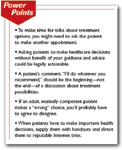Article
Who decides: You or your patient?
Encouraging patients to participate in their treatment decisions can enhance compliance, increase patient satisfaction, and keep you out of court.

"Twenty years ago I probably would have leaned on a patient with this woman's history and diagnosis to get the surgery," Waltman says. "I've since learned that patients who make their own decisions are more motivated to work toward a good result. So rather than talk her into it, I gave her as much information as possible and let her choose how to proceed."
Likewise, gastroenterologist Peter M. Pardoll of Treasure Island, FL, has become increasingly convinced about the wisdom of involving patients in treatment decisions. "Over the years, I've learned that as physicians we are teachers, and I especially cherish the role of educating my patients."
First, cement the physician-patient bond "Good physician-patient rapport is a fundamental building block upon which we can begin sensitive discussions," says pediatrician Gerald B. Hickson, director of the Vanderbilt Medical School's Center for Patient & Professional Advocacy in Nashville. "That means establishing a solid relationship at the front end, one based on respect for the patient. If the physician's spoken and nonverbal message to patients and families is, 'I want to address your concerns and needs,' he can more readily engage patients in serious conversation."
Ideally, healthcare decision-making should be done as a partnership, adds Judith A. Paley, an internist in Denver. The physician contributes science, evidence, and experience, and the patient contributes family history, the situation at hand, personal beliefs, and perhaps evidence gleaned from research.
"The hardest part about this is the time it takes to implement it as part of an office visit," says Paley. "When an important decision is called for, I sometimes ask patients to make another appointment. They may balk at the extra expense involved, but when I start talking about the complexity of the issues at hand, most are happy to do what's needed to be fully briefed on the subject."
Hormone replacement therapy is a good example, Paley notes. "If a patient tells me in the last five minutes of an annual exam that she hasn't had a period in three months and is miserable, I can't ask, 'Do you want to take hormones?' without a detailed discussion of the subject. She might respond that she's read a little and is fearful of hormones, so she'd prefer to do it naturally. I would keep on schedule if I said, 'Okay, it's your decision,' and left it at that, but in doing so I'd be allowing us to make a determination based on media hype.
"After giving her an informational handout on estrogen and bringing her back to discuss all the issues-most importantly the safety of using HRT during the difficult perimenopausal transition-it is, finally, her decision. The same sort of analysis goes into such issues as whether to initiate drug therapy for hypertension, elevated cholesterol, or depression. It's a daily wonder that I tend to run only 20 minutes behind."





